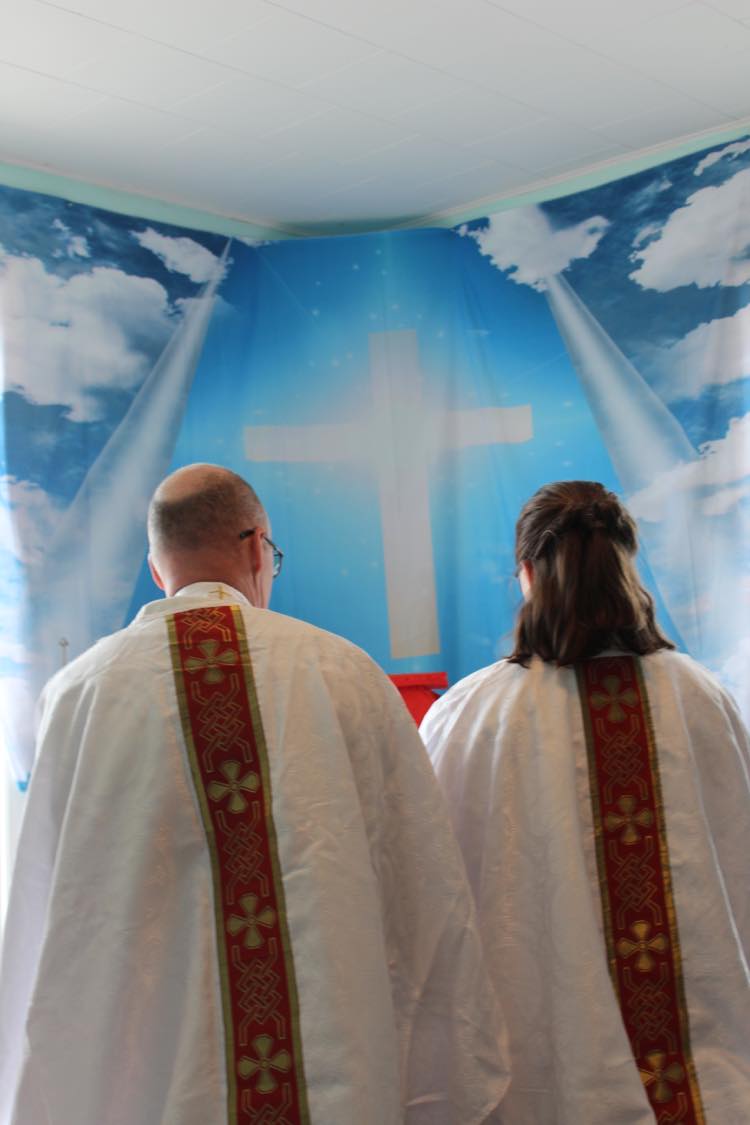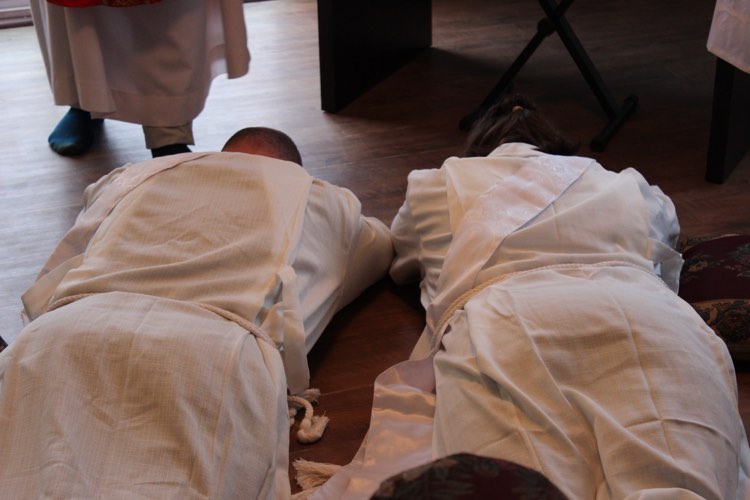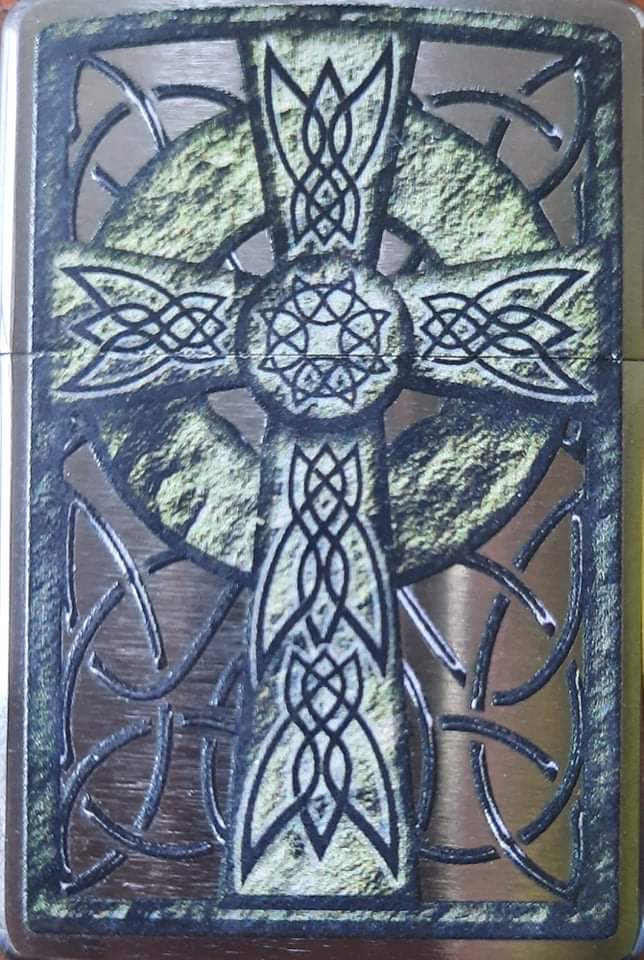- Home
- Seminary Studies
- Christology
Simply Catholic and Welcoming You
Christology
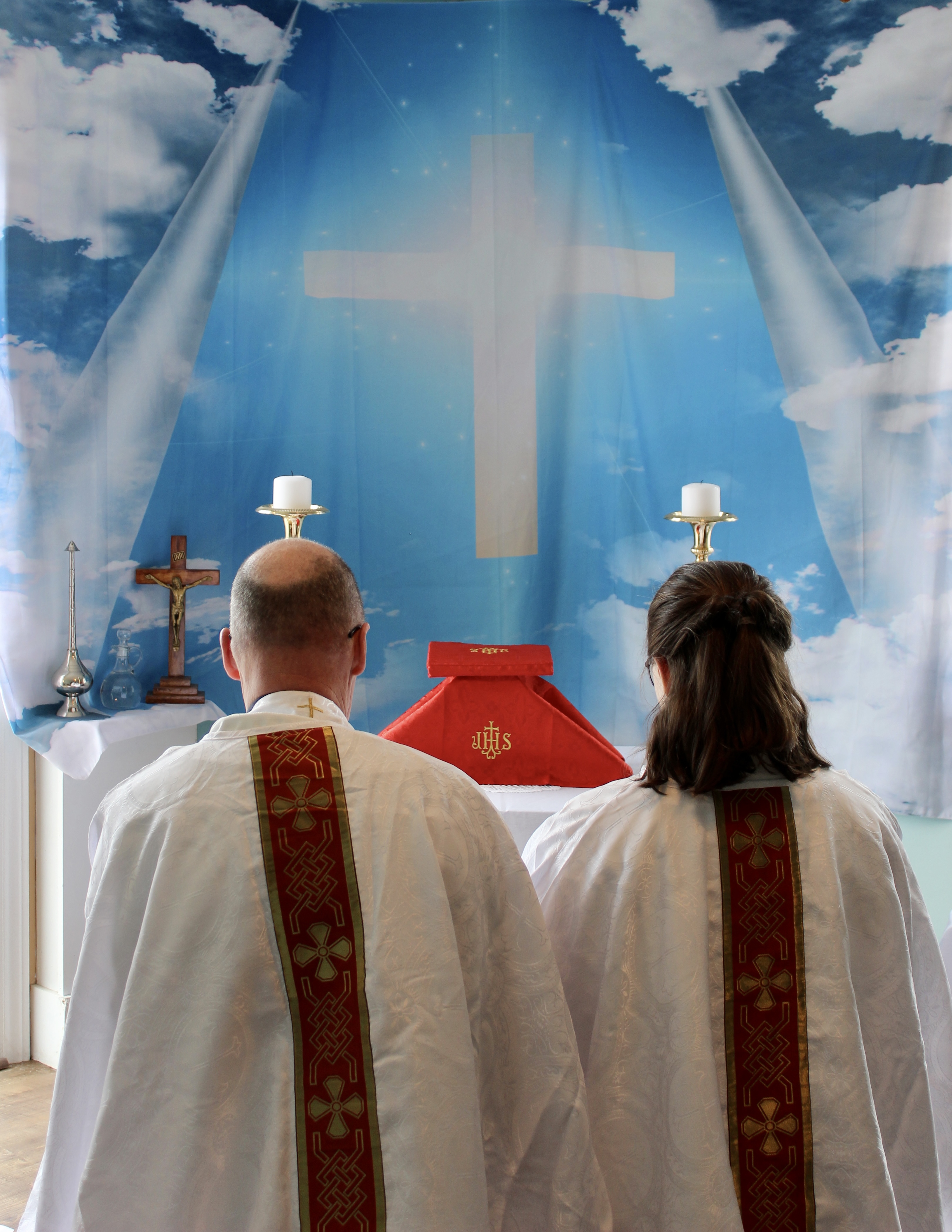
A Priesthood Couple Kneel in Front of The Altar
Christology, the branch of Christian theology relating to the person, nature, and role of Christ. This is the heart and soul of all Christianity. Writing a webpage on this topic is not the issue. Limiting our material to just one webpage is clearly the issue here.
Christology is such a central topic for all Christianity and huge volumes of work already exist on this subject. I will attempt to pare it all down to the most central basics of the Catholic focus on the person, nature and role of Christ and leave the expansions of the topic in the hands of others.
Christology is of critical importance to all Christians as it covers Jesus' earthly birth, life, death, resurrection, and ascension. However, it also pertains to His eternal existence prior to His earthly life, His humanity and deity, Old Testament Christological prophecies, and His future return and reign.
Christology is primarily concerned with the identity of Jesus. Because Christianity asserts that Jesus is human and divine, we ask how both of these can exist in one person. Christology also investigates how this relates to the life and works of Jesus.
Ultimately, whether Jesus claimed to be God is a matter of interpretation and theological debate.
The Deity of Jesus Christ
The church teaches that Jesus is God, and many verses in the Bible are used as evidence.
Claiming "I AM"
Some passages, like John 8:58, where Jesus says "I AM", are interpreted as Him taking the divine name "I AM" which is used for God in the Old Testament.
Claiming to be one with the Father
Jesus states that He and the Father are one (John 10:30) and that He is equal with the Father (John 5:17-18).
"He that hath seen Me hath seen the Father" John 14:9.
Claiming to judge the nations
Jesus claims to have the authority to judge the nations (Matthew 25:31-46), which is a power traditionally attributed to God.
Forgiving sins
Jesus' ability to forgive sins, which was seen as a divine prerogative, was also seen as a claim to be God by some.
The central tenet of Christianity is the belief in Jesus as the Son of God and the Messiah (Christ). Christians believe that Jesus, as the Messiah, was anointed by God as Savior of humanity and hold that Jesus's coming was the fulfillment of messianic prophecies of the Old Testament.
Jesus is the only Mediator between God and man. I Timothy 2:5.
Paul gives the sweeping assertion of Christ being the Sum Total of our redemption and the Focus of all of God's dealings with us in Colossians 1:13-19.
Jesus, Himself gives meaning to the worship of God the Father by the statement, "No man cometh unto the Father but by Me". John 14:6.
Christology, God, Man and Savior
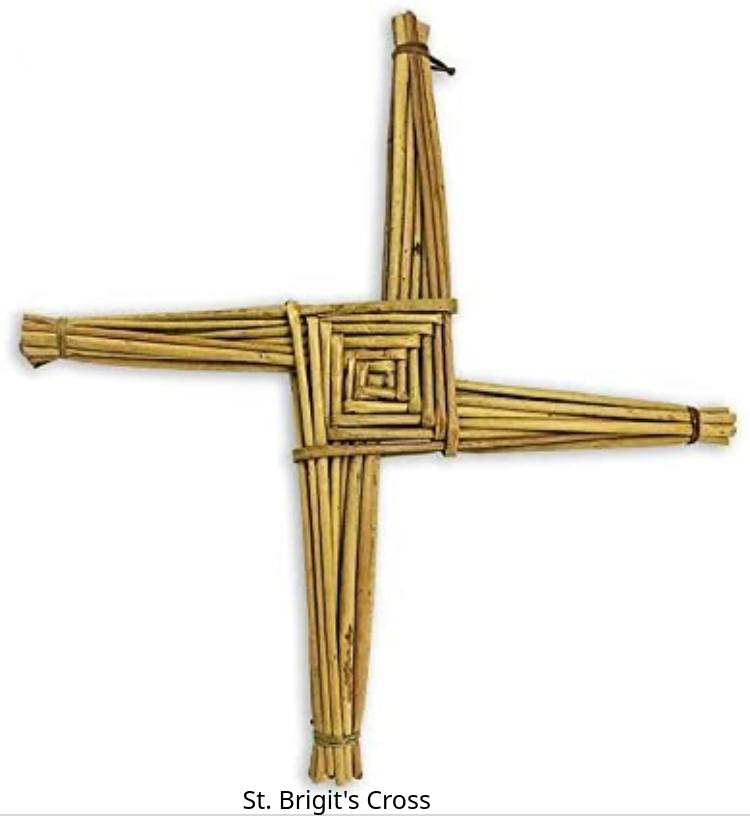
St. Brigit's Cross Made From Palms or Reeds and a Long Time Symbol of Irish Catholicism
Officially for the church it was the council of Nicea, that declared Jesus to be God, based on their interpretation of scriptures and especially the words of Jesus Himself.
The Council of Nicaea, or First Council of Nicaea, was a gathering of Christian bishops convened by Roman Emperor Constantine I in 325 AD to address the Arian controversy. The council's primary goal was to define the nature of Jesus Christ and resolve the dispute over whether He was divine or a created being, as claimed by the Arian perspective. The council's most significant outcome was the Nicene Creed, which affirmed the divinity of Christ and his consubstantiality with God the Father.
Many parts of the scriptures point to Jesus being God and certainly to His existence prior to His Incarnation through His birth to Mary.
The testimony of Jesus Himself
His Oneness with the Father, John 10:30, signifying a co-existence with God.
His existence before Abraham, John 8:58.
John 17:5 "And now, O Father, glorify Thou Me with Thine own self with the glory which I had with Thee before the world was;" a very plain portion.
John 17:24 - He claims the Father loved Him from eternity past. Jn.13:3.
The Testimony of the Prophets.
Micah 5:2; Isaiah 7:14; 9:6-7.
John the Baptist. John 1:30 - "He is preferred before me; for He was before me." Yet from Luke 1:26 we find out that, naturally speaking, John the Baptist was six months older than Jesus. He could only have reference to Christ's preexistence.
The Testimony of the Apostles
John - Especially John 1:1-5, 14. Here is His co-existence with God from eternity, His identity with God, and His creatorship as God back in creative days.
Paul - All through his writings Paul asserts Christ's essential Deity, therefore, His eternality; such as, Philippians 2:6, and His Incarnation in I Timothy 3:16. Colossians is the book in which Paul opposes the Gnostics of his day who denied the Deity of Christ. Colossians 1:15-16.
The Book of Hebrews. 1:2- 3; 13:8
There are so many scripture verses that imply that Jesus was and is God but, for the purpose of this writing I will confine myself to clearer statements such as I have offered.
Jesus Incarnate
The word "Incarnate" literally from the Latin means, "Enfleshment," the taking of humanity as is seen in Hebrews 2:14 - "For as much as the children are partakers of flesh and blood, He also Himself likewise took part of the same; that through death He might destroy him that had the power of death, that is the devil."
Other scripture verses that teach of Jesus taking on His Humanity include;
John 1:14; Romans 8:3; Galatians 4:4- 5.
Writings on His birth include;
Matthew 1:18-25; and Luke 1:26-35 each clearly teach that this preexistent Divine Personage came down to earth and took upon Himself a literal human body and nature.
The True Humanity of Christ
There are simple proofs of Christ’s Humanity - such as His natural birth, His natural life with human frailties and feelings, of hunger, thirst, weariness, temptation, suffering, weeping, sorrowing, and death. These belong primarily to human beings.
God cannot be tempted nor experience any of these other sensations, neither can He be touched with death. Jesus Christ Himself told Thomas, "Handle Me and see, for spirit hath not flesh and bones as ye see Me have." (Luke 24:39) Still, there is more to understanding the true humanity of Christ than ascribing to Him physical humanity.
We see Christ called the "seed of Abraham," (Galatians 3:16), "The seed of David," (John. 7:42) and in (Romans 1:3), "Concerning His Son Jesus Christ our Lord which was made of the seed of David according to the flesh." See also (Galatians 4:4) Made of a woman," (Romans 9:5) and again (Hebrews 2:16) "Seed of Abraham."
To be a mediator between God and man, He must partake of both natures. He must have a true man's nature or He would have no true link with man as He must have a true God nature or He would have no link with God.
Christ Jesus, by all accounts lived and died as a man.
The Exaltation of Christ
The exaltation of Christ began with His resurrection from the dead, and carries through His ascension; His present position at the right hand of the Father with a "Name which is above every name, whether it be in heaven, on earth, or under the earth;" and could be given as continuing through His coming in great power and glory, establishing of His Kingdom, Judging the world, and bringing in of everlasting righteousness.
The Nature of Christ's Exaltation
A restoration to the primeval glory He had with the Father before the world was. John 17:5, 24 Also to be seen in the vision of Him in Revelation 1.
His position at God's right hand, as prophesied. Prophecy, Psalm 110:1; Acts 7:56; Romans 8:34; Colossians 3:1; Hebrews 1:3; Revelation 3:21; and others.
His assumption of all power. Matthew 28:18; I Corinthians 15:27; Ephesians 1:20-22.
He is the Giver of the Holy Ghost. Luke 24:49; John 15-16.
His is the headship of the church. I Corinthians 11:3; 12:12-27; Ephesians 1:22- 23; 5:23-33; Colossians 1:18.
Now Christians await with a sense of expectancy until He can consummate His sovereign rulership over all things. Psalm 110:1; Hebrews 10:13.
His Exaltation will not be complete until He is crowned King of Kings and Lord of Lords, and His enemies are put under His feet, and every tongue confesses His sovereign Lordship.
The Works of Christ
The "works of Christ" encompass all of Jesus' actions and teachings, including his incarnation, ministry, sacrifice, and resurrection. They are seen as a multifaceted expression of God's love and grace, aimed at reconciling humanity with God and offering salvation. His work is also understood in terms of his threefold office as prophet, priest, and king.
Here's a more detailed look at the various aspects of the works of Christ:
Incarnation and Ministry
Jesus, as the Son of God, entered the world as a human being, lived a life of perfect obedience to God, and taught about God's kingdom.
Atonement
Jesus' death on the cross is considered the central work of Christ, offering forgiveness of sins and reconciliation with God.
Resurrection
His resurrection is seen as a victory over death and sin, and a promise of eternal life for those who believe.
God's Will
Jesus' actions are always aligned with God's will, glorifying the Father.
Threefold Office
Christ's work is understood through the lens of his role as prophet, priest, and king, each contributing to God's plan for salvation.
Ongoing Work
Even after his resurrection, Jesus is believed to be actively working for the salvation and sanctification of believers, preparing a place for them in heaven, and exercising authority over the universe.
The Miracles of Christ
The miracles of Christ, as described in the Gospels, are extraordinary events attributed to Jesus of Nazareth, demonstrating his divine power and authority. These miracles are broadly categorized into healing miracles, exorcisms, nature miracles, and resurrection miracles. Examples include healing the sick, casting out demons, calming storms, raising the dead, and transforming water into wine.
Types of Miracles
Healing Miracles
Jesus healed a wide variety of physical ailments, including blindness, paralysis, leprosy, and various other diseases.
Exorcisms
Jesus cast out demons from individuals who were possessed, restoring them to mental and spiritual health.
Nature Miracles
Jesus performed miracles that defied the laws of nature, such as calming a storm on the Sea of Galilee and walking on water.
Resurrection Miracles
Jesus raised the dead, most notably Lazarus, demonstrating His power over death.
His Miracles Included;
Turning water into wine at the wedding in Cana. The first miracle recorded in the Gospel of John.
Healing a blind man at birth. Jesus restored the sight of a man who had been blind since birth.
Feeding the 5000. Jesus miraculously multiplied bread and fish to feed a large crowd.
Raising Lazarus from the dead. Jesus restored Lazarus to life four days after his death.
Healing the paralytic at Capernaum. Jesus forgave the man's sins and healed him.
Raising the widow's son. Jesus restored the life of a young man who had died.
Healing the bleeding woman: Jesus healed a woman who had been bleeding for twelve years.
Healing a man with a withered hand: Jesus healed a man with a withered hand on the Sabbath.
Cleansing ten lepers. Jesus cleansed ten lepers, and only one returned to thank him.
Healing a deaf-mute. Jesus restored the hearing and speech of a deaf-mute man.
Walking on water. Jesus walked on water to the astonishment of His disciples.
Stilling the storm. Jesus calmed a violent storm on the Sea of Galilee.
These miracles are seen as evidence of Jesus' divine authority and His role as the Messiah, the Son of God. They are central to Christian faith and belief in the power of God.
The New Testament records 37 specific miracles performed by Jesus, with Mark's Gospel recording the most. However, the Gospels also mention that Jesus performed many other miracles that were not explicitly recorded, and John's Gospel explicitly states that if every miracle were recorded, the world would not contain the books.
So, apparently I am not the only one who feels this subject is too broad and has simply too much material for one author to cover, let alone on a single web page. 🙂
Recent Articles
-
Catholic-Confession
Apr 19, 25 08:53 PM
Full breakdown of the Catholic Confession Sacrament of Reconciliation -
Ordination, incardination and dismissal of clergy
Mar 03, 25 06:47 PM
Overview of Ordination to Holy Orders, incardination and dismissal of clergy -
Catholic Last Rites
Mar 03, 25 06:41 PM
An explanation of the Catholic Last Rites and Anointing of the Sick
